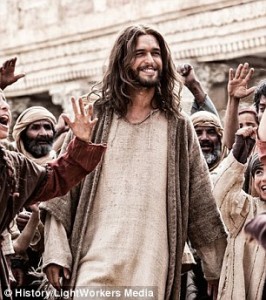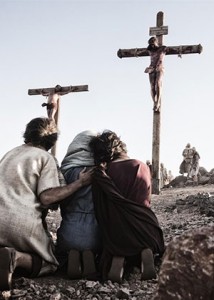Hollywood Lights a Candle
By Ken Walker-

The piece examines whether the popular The Bible mini-series will spark other faith-themed TV shows and movies, similar to the aftermath of The Passion of the Christ in 2004. And, whether that is a good thing.
Since no space limitations exist on the Internet, the digital version is likely longer than what will appear in print. Still, I have other unused material, including some comments from two Hollywood veterans.
A Critical Moment
One is Jonathan Bock, the president of Grace Hill Media. In addition to the mini-series, his firm has promoted such movies as Lord of the Rings, Water Horse, National Treasure and Ratatouille.

“We have fought and scratched for a dozen years to catch up and be ‘relevant,’” Bock says. “And here we are. So what will we do with this moment? Will we grouse and complain when things aren’t 100 percent perfect? Or will we have a bigger, eternal vision and pray for this moment to be Hollywood yearning in its soul to know God?”
Tilting the Conversation
In this media-savvy executive’s eyes, anything that keeps cultural conversation tilted towards faith is a net plus. As an example, he named the popular book and film that stirred a hornet’s nest of controversy and several book-length responses from Christian publishers: The Da Vinci Code.
While saying whether that was a positive or negative for faith could be argued both ways, Bock asked: When was the last time in pop culture people actually cared what happened at the council of Nicaea? So if the whole world wants to talk about the Bible, let’s talk, he says.
“I’m going to put it this way—when MTV is asking producers to pitch them faith-themed shows because ‘the Bible is hot,’ I’d say the cultural landscape is changed,” Bock says.
Uniting Behind a Phenomenon

Like Bock, he calls it a positive whenever a major movie studio or TV network spends millions of dollars telling a positive story grounded in the Christian faith.
Certainly not everything will be exactly accurate theologically. Or, some viewers won’t like the way Goliath looked or agree on Paul’s conversion scene. But, says Cooke, we can either nit-pick or unite behind a global phenomenon.
In the past, society viewed the idea of “patrons” of the arts as a few rich families who supported great artists like Michelangelo or Rembrandt. However, today Cooke says everyone can act as patrons by supporting great films and TV programs.
“What we need to realize is that Hollywood doesn’t respond to criticism or boycotts—Hollywood responds to the box office,” Cooke says. “So if the Christian community would unite as one, and support the best projects Hollywood is creating, we could have an incredible impact.”
Lighting a Candle
Cooke’s comment reminds of a story I heard recently about a pastor who hated that a bar was located near his church. He used to curse it constantly when he drove by. But when it burned down, the owner rebuilt it and made it bigger.
When the pastor asked why, God told him to pray that the people inside start living the kind of lives that He intended for them to live. When he did, within three months, the owner decided to follow Christ and closed the bar.
Each of us can rant and rave about morally-bankrupt movies and TV shows or support those making positive alternatives. Actions speak louder than words, although it is also much tougher to take action instead of airing idle gripes.


